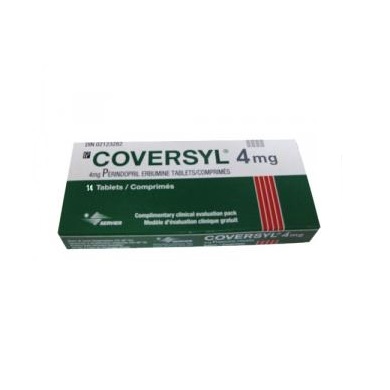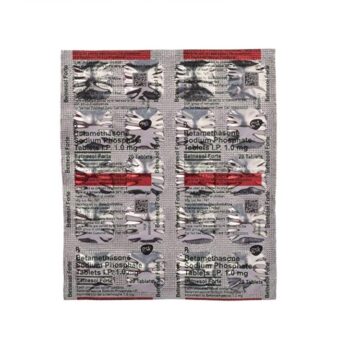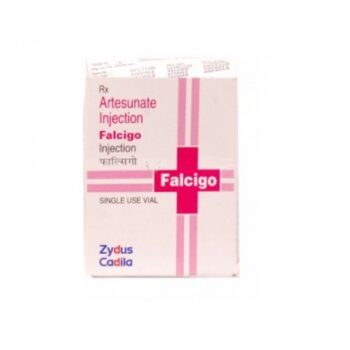Coversyl 4mg
Coversyl 4mg contains Perindopril, an ACE inhibitor used to treat high blood pressure (hypertension) and heart-related conditions. It works by relaxing blood vessels, improving blood flow, and reducing strain on the heart.
Coversyl is also prescribed for heart failure and to prevent complications in patients with coronary artery disease. Regular use helps lower the risk of heart attacks and strokes.
It should be taken once daily, preferably in the morning before meals. Possible side effects include dizziness, dry cough, and fatigue.
Uses
- Hypertension (High Blood Pressure) – Lowers blood pressure by relaxing blood vessels.
- Heart Failure – Improves heart function and reduces strain on the heart.
- Coronary Artery Disease (CAD) – Helps prevent heart attacks and strokes.
- Post-Heart Attack Recovery – Supports heart health after a cardiac event.
- Kidney Protection in Diabetics – Reduces the risk of kidney damage in diabetic patients.
- Stroke Prevention – Lowers the chances of stroke in high-risk individuals.
- Improves Blood Circulation – Enhances oxygen supply to the heart and other organs.
How to use it ?
Take Coversyl 4mg exactly as prescribed by your doctor. The usual dose is one tablet daily, preferably in the morning before meals for better absorption. Swallow the tablet whole with a glass of water—do not crush or chew it.
Try to take it at the same time every day to maintain consistent blood levels. If a dose is missed, take it as soon as possible, unless it is close to the next dose—never double the dose.
Regular blood pressure monitoring is essential. Consult your doctor before stopping the medication, as sudden discontinuation may worsen your condition.
How dose it works ?
Coversyl 4mg contains Perindopril, an angiotensin-converting enzyme (ACE) inhibitor that helps lower blood pressure and improve heart function.
It works by blocking the ACE enzyme, which is responsible for producing angiotensin II, a substance that narrows blood vessels. By reducing angiotensin II levels, Coversyl causes blood vessels to relax and widen, leading to improved blood flow and reduced strain on the heart.
This helps lower high blood pressure, enhance oxygen supply to the heart, and protect the kidneys in diabetic patients. It also reduces the risk of heart attacks, strokes, and heart failure progression.
Doses
The dosage of Coversyl 4mg varies depending on the condition being treated and individual patient needs.
-
For Hypertension (High Blood Pressure): The usual starting dose is 4mg once daily, which may be increased to 8mg daily if needed.
-
For Heart Failure: The starting dose is usually 2mg once daily, which may be increased to 4mg daily based on tolerance.
-
For Coronary Artery Disease Prevention: The recommended dose is 4mg daily, which may be increased to 8mg daily if well tolerated.
Benefits of Coversyl 4mg
- Effectively Lowers Blood Pressure – Helps manage hypertension and reduces heart strain.
- Improves Heart Function – Supports heart health in patients with heart failure.
- Prevents Heart Attacks & Strokes – Reduces cardiovascular risks in high-risk individuals.
- Enhances Blood Circulation – Promotes better oxygen and nutrient delivery.
- Protects Kidney Function – Helps prevent kidney damage, especially in diabetics.
- Reduces Fluid Retention – Helps prevent swelling and related complications.
- Long-Lasting Effect – Provides 24-hour blood pressure control with a single daily dose.
- Well-Tolerated – Suitable for long-term use under medical supervision.
Side effect of Coversyl 4mg
- Dizziness or lightheadedness
- Dry, persistent cough
- Fatigue or weakness
- Headache
- Nausea or stomach discomfort
- Low blood pressure (hypotension)
- Muscle cramps or joint pain
- Sleep disturbances
- Skin rash or itching
- Swelling of the face, lips, or throat
- Increased potassium levels (hyperkalemia)
- Kidney function changes (rare but serious – requires monitoring)
Precautions
Before taking Coversyl 4mg, inform your doctor if you have kidney or liver disease, diabetes, or a history of low blood pressure.
Avoid use if you are pregnant or breastfeeding, as it may harm the baby. Monitor potassium levels, as this medication can increase potassium, leading to complications.
Do not combine with NSAIDs, diuretics, or other blood pressure medications without medical advice. Avoid alcohol, as it can worsen dizziness.
If you experience swelling, difficulty breathing, or severe dizziness, seek immediate medical attention.
Frequently asked question












Reviews
There are no reviews yet.